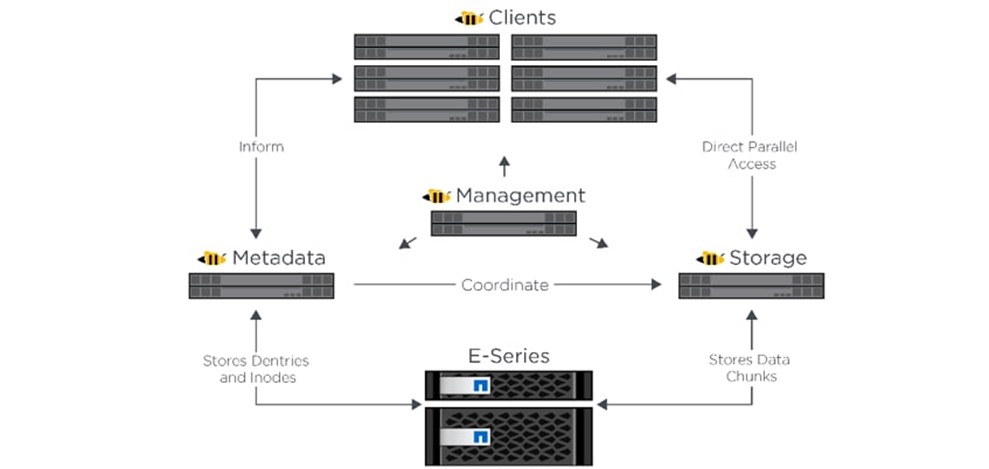BeeGFS Bolt On
BeeGFS is a hardware-independent POSIX parallel file system (a.k.a. Software-defined Parallel Storage) developed with a strong focus on performance and designed for ease of use, simple installation, and management.

Pre Requisites before installing BeeGFS client
If the user intends to use BeeGFS, ensure that a BeeGFS cluster has been set up with beegfs-mgmtd, beegfs-meta, beegfs-storage services running.
Ensure that the following ports are open for TCP and UDP connectivity:
Port
Service
8008
Management service (beegfs-mgmtd)
8003
Storage service (beegfs-storage)
8004
Client service (beegfs-client)
8005
Metadata service (beegfs-meta)
8006
Helper service (beegfs-helperd)
To open the ports required, use the following steps:
firewall-cmd --permanent --zone=public --add-port=<port number>/tcp
firewall-cmd --permanent --zone=public --add-port=<port number>/udp
firewall-cmd --reload
systemctl status firewalld
Ensure that the nodes in the inventory have been assigned only these roles: manager and compute.
For RedHat clusters, ensure that RedHat subscription is enabled on all target nodes. Every target node will require a RedHat subscription.
Note
If the BeeGFS server (MGMTD, Meta, or storage) is running BeeGFS version 7.3.1 or higher, the security feature on the server should be disabled. Change the value of
connDisableAuthenticationtotruein /etc/beegfs/beegfs-mgmtd.conf, /etc/beegfs/beegfs-meta.conf and /etc/beegfs/beegfs-storage.conf. Restart the services to complete the task:systemctl restart beegfs-mgmtd systemctl restart beegfs-meta systemctl restart beegfs-storage systemctl status beegfs-mgmtd systemctl status beegfs-meta systemctl status beegfs-storage
Note
BeeGFS with OFED capability is only supported on RHEL 8.3 and above due to limitations on BeeGFS. When setting up your cluster with RDMA support, check the BeeGFS documentation to provide appropriate values in input/storage_config.yml.
If the cluster runs Rocky, ensure that versions running are compatible:
Rocky OS version |
BeeGFS version |
|---|---|
Rocky Linux 8.4: no OFED, OFED 5.3, 5.4 |
7.3.2 |
Rocky Linux 8.5: no OFED, OFED 5.5 |
7.3.2 |
Rocky Linux 8.6: no OFED, OFED 5.6 |
7.3.2 |
Rocky Linux 8.4: no OFED, OFED 5.3, 5.4 |
7.3.1 |
Rocky Linux 8.5: no OFED, OFED 5.5 |
7.3.1 |
Rocky Linux 8.6: no OFED, OFED 5.6 |
7.3.1 |
Rocky Linux 8.4: no OFED, OFED 5.3, 5.4 |
7.3.0 |
Rocky Linux 8.5: no OFED, OFED 5.5 |
7.3.0 |
Rocky Linux 8.4: no OFED, OFED 5.3, 5.4 |
7.2.8 |
Rocky Linux 8.5: no OFED, OFED 5.5 |
7.2.8 |
Rocky Linux 8.6: no OFED, OFED 5.6 |
7.2.8 |
Rocky Linux 8.4: no OFED, OFED 5.3, 5.4 |
7.2.7 |
Rocky Linux 8.5: no OFED, OFED 5.5 |
7.2.7 |
Rocky Linux 8.6: no OFED, OFED 5.6 |
7.2.7 |
Rocky Linux 8.5: no OFED, OFED 5.5 |
7.2.6 |
Rocky Linux 8.6: no OFED, OFED 5.6 |
7.2.6 |
Rocky Linux 8.4: no OFED, OFED 5.3, 5.4 |
7.2.5 |
Rocky Linux 8.4: no OFED, OFED 5.3, 5.4 |
7.2.4 |
Servers running all versions of RHEL support BeeGFS except 8.6. For more info, click here
Installing the BeeGFS client via Omnia
After the required parameters are filled in input/storage_config.yml, Omnia installs BeeGFS on manager and compute nodes while executing the omnia.yml playbook.
Note
BeeGFS client-server communication can take place through TCP or RDMA. If RDMA support is required, set
beegfs_rdma_supportshould be set to true. Also, OFED should be installed on all target nodes.For BeeGFS communication happening over RDMA, the
beegfs_mgmt_servershould be provided with the Infiniband IP of the management server.